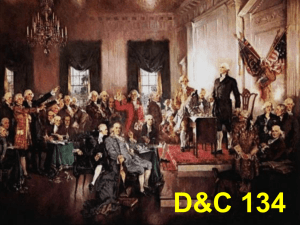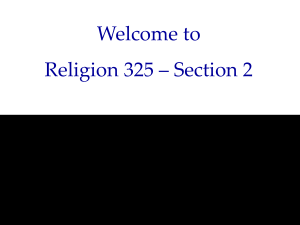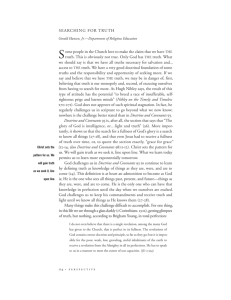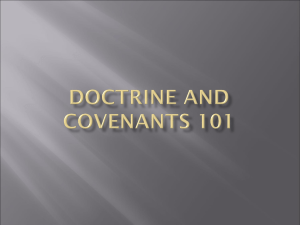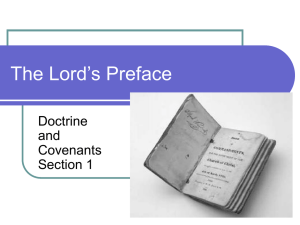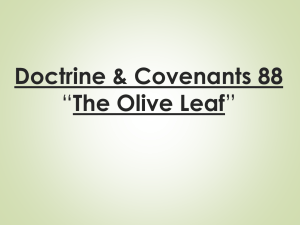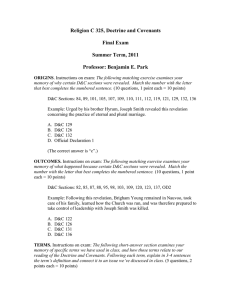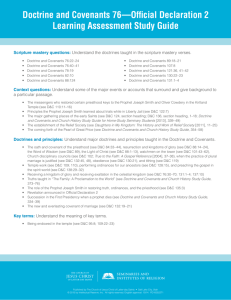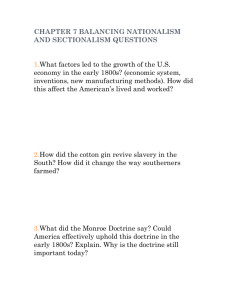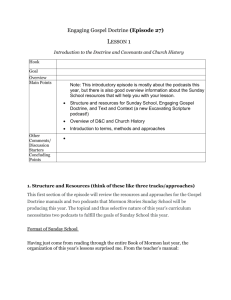D&C 107-110
advertisement
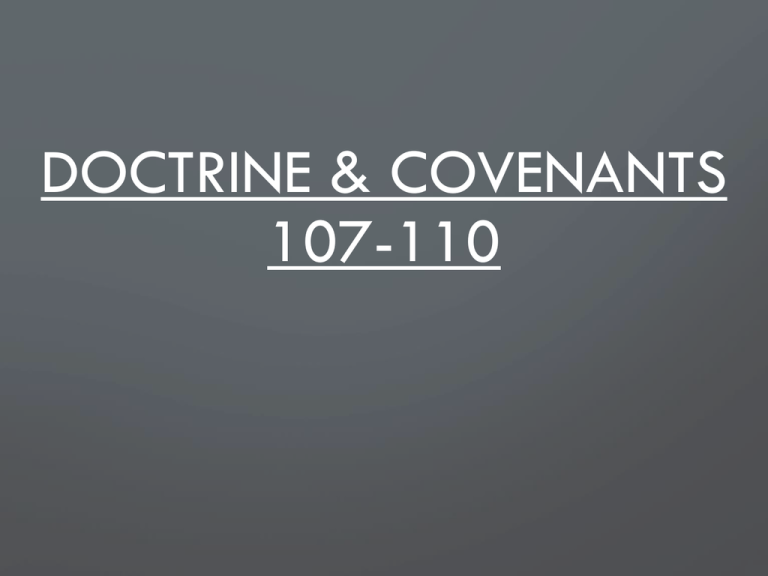
DOCTRINE & COVENANTS 107-110 Doctrine & Covenants 107 Can you tell me the original name of the Melchizedek Priesthood? Why was it named Melchizedek Priesthood? (Alma 13 and J.S.T. Genesis 14:25-40) Surely no greater tribute or more generous adulation could be mentioned than to be so much like the Son of God that one’s name could be substituted for his in the title of the most powerful force in the universe --the Holy Priesthood, after the Order of the Son of God. Melchizedek as a Type or Shadow of Christ: 1. A great high priest (Doctrine & Covenants 107:2) 2. None were greater (Alma 13:19) 3. Offered the Lord’s Supper (Gen. 14:18-20; JST, Gen. 14:17-20) 4. Established righteousness among his followers (JST, Gen. 14:33-34) 5. Known as the “prince of peace” (JST, Gen. 14:33) 6. Known as the “king of heaven” (JST, Gen. 14:36) 7. Known as the “king of peace” (JST, Gen. 14:36) 8. The holy priesthood was named after him (Doctrine & Covenants 107:2-4) Doctrine & Covenants 107:1-6 Joseph Smith said all priesthood is Melchizedek, but there are separate portions or degrees of it (Teachings, 180). Seniority in the first Quorum of the Twelve: Thomas B. Marsh 35 David W. Patton 35 Brigham Young 33 Heber C. Kimball 33 Orson Hyde 30 William E. McLellin 29 Parley P. Pratt Luke S. Johnson William B. Smith Orson Pratt John F. Boynton Lyman E. Johnson 27 27 23 23 23 23 Thomas B. Marsh was in his thirty-fifth year but did not turn thirty-five until November – 1835. At the time David Patten did not know his age; however, subsequent records show he was actually older than Thomas, having been born on the 14th of November, 1799. We do not magnify the Priesthood, we magnify our office in the Priesthood. We cannot magnify the greatest power in the Universe (Romans 11:13). Doctrine & Covenants 107:23-26 What’s the difference between a “special witness” of Christ and “especial” witness of Christ? President Boyd K. Packer said the difference was the letter “e.” The real difference is that one holds keys and the other doesn’t. President Bednar said that we are now in position with the five quorums of seventy in place to govern 500 million members of the Church. I have heard President Kimball say (and it is something that other presidents of the Church have said) that while he holds all of the keys that are upon the earth, there are keys that he does not hold. There are keys that have not been given to him as president of the Church because they are reserved for higher power and authority. For example, he said that he does not hold the keys to the resurrection. The Lord has them, but He does not delegate them --- neither anciently, nor to the modern prophets. He mentioned, also, the authority to command the elements and to walk on the water. The Lord has these keys, but He has not given them to us (Doctrine of Salvation, comp. Bruce R. McConkie, 3 vols. [Salt Lake City: Bookcraft, 1954-56], 1:152). Doctrine & Covenants 107:41-57 What’s going on here? Doctrine & Covenants 107:99-100 Learn your duty! Doctrine & Covenants 107:53-55 “Joseph’s blessing to his father” These verses were taken from the blessing given by Joseph Smith to his father, Joseph Smith Sr., when he was ordained the first patriarch in this dispensation on the 18th of December,1833. Doctrine & Covenants 107:53 “Adam blessed his posterity” Joseph Smith told us that Adam blessed his posterity because “he wanted to bring them into the presence of God” (Teachings, 159). Doctrine & Covenants 107:57 “The Book of Enoch” A number of ancient manuscripts attributed to Enoch are still in existence today. These manuscripts are generally classified as pseudepigraphic (meaning falsely named). Elder Bruce R. McConkie observed: “In the pseudepigraphic writing of Enoch we find visions, prophecies, exhortations, and doctrinal expositions relative to the Second Coming and the Millennium; the names and functions of the seven angels (including Raphael, Michael, and Gabriel); the separation of the spirits of righteous and wicked men as they await the day of judgment; the coming judgment of the wicked; the attainment of salvation by the righteous, etc… As with the study of apocryphal books, so it is with the study of the pseudepigraphic writings: the seeker after revealed wisdom must be guided by the power of the Holy Spirit” (Bruce R. McConkie, Mortal Messiah 1:274-75). We fully expect all of Enoch’s writings to be restored to us in the purity in which he originally recorded them. Doctrine & Covenants 107:77-84 “Church Discipline” Charges were preferred against Joseph Smith by Sylvester Smith, a member of the first high council in Kirtland. George A. Smith gave this recollection of what happened: “I remember well in Zion’s Camp, Levi W. Hancock made a fife, from a joint of sweet elder, Sylvester Smith marched his company to the music of that fife. That fife may be considered almost the introduction of martial music among the ‘Mormons.’ A dog came out and barked and Sylvester Smith said he was going to kill the dog. Joseph said he was a good watch dog and to leave it alone. Sylvester became mad at the Prophet and again threatened to kill the dog; finally Joseph reproved him sharply, showing him that such a spirit would not conquer or control the human family, that he must get rid of it, and predicted that if he did not get rid of it, the day would come when a dog would gnaw his flesh, and he would not have the power to resist it. Some months after the return to Kirtland, Sylvester Smith preferred to charge against Joseph the Prophet, for having prophesied lies in the name of the Lord, and undertook to substantiate that charge on the ground that the Prophet had said a dog should bite him, if he did not get rid of that spirit, when he had not power to resist. They were three days and part of nights, when the High Council in Kirtland, in investigating this charge; one person spoke three hours in behalf of the Prophet. Sylvester published a confession, which can be seen in the Church History, acknowledging his fault” (Journal of Discourses, 11:7). Doctrine & Covenants 107:85-88 “12 Deacons, 24 Teachers, 48 Priests” The only officers on the ward level who hold keys are the Deacons Quorum President, the Teachers Quorum President, the Bishop and the Elders Quorum President. Doctrine & Covenants 108 Lyman Sherman: Faithful in Zion’s Camp. Called as one of the 7 presidents of the seventy. Called to the Apostleship on January 16th, 1839, but was not notified or ordained before his death in February, 1839. Note the letter from J. H. Martineau to President John Taylor: Dear Brother, I trust you will pardon me for this trespassing in your time, for you are the only one to whom I can apply. I feel anxious that a work may be done for Lyman P. Sherman, my wife’s father, who died in Far West in 1838. I would like to have him and his wife received the 1st and 2nd anointing, to have them sealed together, and have their children sealed to them. My wife’s brother, Albey, the eldest of the family living, has no desire, apparently, to do anything for his parents, though I have urged him to do so. He has for years been on the background and seems to think nothing of these things. I do not wish to cancel any of his rights, but do wish that a work may be done for his wife’s parents while the present opportunity exists. My son Lyman, of Logan, could act for his grandfather, and I could, if approved, receive the 2nd anointing for him. My daughter acting for her grandmother, and I could, if approved, receive, whatever your decision. Doctrine & Covenants 108:4 “Lyman Sherman Williams” The purpose of solemn assemblies is for the Saints to worship. This revelation informed Lyman Sherman that he was to be numbered among the first to receive the endowment. These were those who had proven themselves worthy of such an honor in Zion’s Camp. “You shall be remembered with the first of mine elders” They would be the first elders in this dispensation to be endowed with power in the Kirtland Temple. Doctrine & Covenants 108:6 “Right to preach my gospel wheresoever I shall send you” Joseph Smith explained, “The endowment was to prepare the disciples for their missions unto the world” (Teachings, 274). Doctrine & Covenants 109 1. Dedicatory Prayers are always read: The dedicatory prayer was pronounced by Joseph Smith in the afternoon when he announced that Peter the Apostle had been in their midst to accept the dedication. We prepared for the dedication of the Lord’s house. I met in the presidents room. Joseph Smith, Sidney Rigdon, Warren Cowdery, and Elder W. Parrish, and myself assisted in writing a prayer for the dedication of the house (Oliver Cowdery’s Journal). 2. It cost around $70,000 and took about three years to build. It was a great sacrifice to the people. The saints still owed $13,000 on the temple at the day of dedication and took collections at the door. $1,000 was raised that day. Frazier Eaton, who had previously donated $700.00 was not allowed in the temple because of the lack of seating. He felt his contribution to the temple should have assure him a seat and later left the church because of it. 3. March 27th, 1836, was the day of the “dedication” of the temple. 4. It was a partial “endowment” house. 5. The “Spirit of God” was sung and is now sung at every temple dedication. 6. The service lasted 7 hours and no one left. About 800 saints were turned away and went to the school house and had a meeting of their own. 7. Joseph read the dedicatory prayer, the sacrament was passed and Frederick G. Williams said he saw the Savior. The Apostle Peter came and sat by Joseph Smith Sr. Joseph Smith Jr. blessed the congregation and concluded with the Hosanna Shout. 8. Later that evening 416 bearers of the priesthood gathered (more marvelous manifestations). Doctrine & Covenants 109:1 “The Dedicatory Prayer” The only other dedicatory prayer for a temple found in holy writ is offered by Solomon at the dedication of his temple (1 Kings 8:23-61). “The dedicatory prayer is addressed to the Father, as all prayers should be; it is addressed to the “One” whose original command it was that the house be built, which direction had been revealed to the builders by the Son through whom all revelation comes” (Bruce R. McConkie, Promised Messiah, 561-62). Why Temples? Doctrine & Covenants 109:5 That the Son of Man might have a place to manifest himself to his people. Doctrine & Covenants 109:6-9 A house of learning. Doctrine & Covenants 109:10-14 When dedicating a building, we present it officially as our gift to the Lord. This means that tomorrow morning when anyone enters this building, they come here as guests of the Lord. It then belongs to Him (Boyd K. Packer). Doctrine & Covenants 109:20 “Ordinances Performed” These rites were performed on the third floor of the temple. It was only after temples were built in the territory of Utah that recommends signed by priesthood leaders were required of those desiring to enter the temple. Doctrine & Covenants 109:35-37 The Lord’s acceptance Doctrine & Covenants 109:44 Thy will be done! Doctrine & Covenants 109:36-37 “Let the Anointing of thy ministers be sealed upon them.” Preparatory to the anticipated outpouring of the Spirit at the dedication of the temple, the Prophet and the “first elders” were washed and anointed. Joseph Smith records as follows, on 21 January 1836: “About three o’clock, p.m., I dismissed the school, and the Presidency retired to the attic story of the printing office, where we attended the ordinance of washing our bodies in pure water. We also perfumed our bodies and our heads, in the name of the Lord. “At early candle-light I met with the Presidency at the west school room, in the Temple, to attend to the ordinance of anointing our heads with holy oil; also the Councils of Kirtland and Zion met in the two adjoining rooms, and waited in prayer while we attended to the ordinance. I took the oil in my left hand, Father Smith being seated before me, and the remained of the Presidency encircled him round about. We then stretched our right hands toward heaven, and blessed the oil, and consecrated it in the name of Jesus Christ. “We then laid our hands upon our aged Father Smith, and invoked the blessings of heaven. I then anointed his head with the consecrated oil, and sealed many blessings upon him. The Presidency then in turn laid their hands upon his head, beginning at the oldest, until they had all laid their hands upon him, and pronounced such blessings upon his head, as the Lord put into their hearts, all blessing him to be our Patriarch, to anoint our heads, and attend to all duties that pertain to that office. The Presidency then took the seat in their turn, according to their age, beginning at the oldest, and received their anointing and blessing under the hands of Father Smith. And in my turn, my father anointed my head” (History of the Church, 2:379-80). During the weeks that preceded the dedication of the temple, others of the brethren participated in the biblical ritual of washing and anointing. Doctrine & Covenants 109:39 “Come forth to Zion, or to her stakes” And every stake becomes the place of gathering for the saints who live in the area involved” (Bruce R. McConkie, Millennial Messiah 294-95). Doctrine & Covenants 109:60 “Identified with the Gentiles” As used in the Bible, the word Gentile means nation – a collective body. Any nation that does not have prophets at its head, revelation as its constitution, and the Messiah as its king is a gentile nation. Doctrine & Covenants 109:61-64 “Tribe of Judah to return to old Jerusalem” As part of the promises of the Lord to be fulfilled before the coming of the Son of Man, the Prophet Joseph Smith taught that “the tribe of Judah will return to old Jerusalem” (Teachings, 17). Jerusalem had not been under Jewish control since the Roman destruction of the holy city in 70 AD. Doctrine & Covenants 109:79 “Mingle our voices with shining seraphs singing” “The veil is very thin in the temples,” explained Dallin H. Oaks, “especially when we join in worshiping through music. At temple dedications I have seen more tears of joy elicited by music than by the spoken word. I have read accounts of angelic choirs joining in these hymns of praise, and I think I have experienced this on several occasions. In dedicatory sessions featuring beautiful and well-trained choirs of about thirty voices, there are times when I have heard what seemed to be ten times thirty voices praising God with a quality and intensity of feeling that can be experienced but not explained. Some who are listening today will know what I mean” (Conference Report, October 1994, 11). Doctrine & Covenants 109:79-80 The word hosanna as we know it originated from two Hebrew words found in Psalm 118:25, and roughly means, “Save us, we beseech thee.” According to Elder Bruce R. McConkie, the two most important things you can do in this life are: 1. Marry the right person in the right place, by the right authority, the temple. 2. Keep the covenants made in the temple. Just for fun! Which temple is the largest? 1. Salt Lake City 253,015 sq. ft. 2. Los Angeles 190,614 sq. ft. 3. Washington D.C. 160,000 sq. ft. 4. Jordan River Utah 148,236 sq. ft. 5. Provo Utah 128,325 sq. ft. … 95. Colonia Juarez Chihuahua Mexico (1995) 6,800 sq. ft. Doctrine & Covenants 110 After this meeting, Fast Sundays began. Prior to this time period they were held on the first Thursday of every month. The Kirtland Temple was used for many meetings besides the performing of sacred ordinances. Active and worthy Saints as well as less active Saints were invited to attend meetings held. Children were also allowed to enter the Temple. April 3rd, 1836, the Jews were expecting Elijah and he indeed came! It was Easter Sunday, Passover Sunday. President Joseph Fielding Smith noted an interesting aspect of Elijah’s return to the earth on April 3rd, 1836. “Edersheim in his work, The Temple, says: ‘To this day, in every Jewish home, at a certain part of the paschal service (i.e., when they drink the “third cup”) – the door is opened to admit Elijah the prophet as forerunner of the Messiah, while appropriate passages are at the same time read which foretell the destruction of all heathen nations. It is a remarkable coincidence that, in instituting his own Supper, the Lord Jesus connected the symbols, not of judgment, but of his dying love, with his “third cup.”’ “It was, I am informed, on the third day of April, 1836, that the Jews in their homes at the Paschal feast, opened their doors for Elijah to enter. On that very day Elijah did enter – not in the home of the Jews to partake of the Passover with them – but he appeared in the house of the Lord in Kirtland, and there bestowed his keys to bring to pass the very things for which these Jews, assembled in their homes, were seeking” (Doctrines of Salvation, 2:100-01). Doctrine & Covenants 110:1 “The veil was taken from our minds” Such was the experience of Joseph Smith and Oliver Cowdery on this occasion as the veil was lifted, allowing them to stand in the presence of the God of Israel and receive his instruction (Alma 19:6). Doctrine & Covenants 110:2 “We saw the Lord” Like Joseph and Oliver, John Murdock also saw the Lord. He recorded: “The visions of my mind were opened, and the eyes of my understanding were enlightened, and I saw the form of a man, most lovely! The visage of his face was sound and fair as the sun. His hair, a bright silver gray, curled in most majestic form, His eyes, a keen penetrating blue, and the skin of his neck a most beautiful white, and He was covered from the neck to the feet with a loose garment, pure white, whiter than any garment I have ever before seen. His countenance was most penetrating, and yet most lovely! And while I was endeavoring to comprehend the whole personage, from head to feet, it slipped from me, and the Vision was closed up. But it left on my mind the impression of love, for months, that I never before felt, to that degree” (Karl Ricks Anderson, Joseph Smith’s Kirtland, 109-10). Doctrine & Covenants 110:1-10 The Lord’s acceptance Jesus Christ: Although we do not normally think of the Lord as bestowing keys on this occasion, as did the other heavenly visitors, Orson Pratt informs us that He did indeed give “keys of instruction and counsel and authority to his servants.” Moses: The main object was to build unto the Lord a house whereby He could reveal unto His people the ordinances of His house and the glories of His Kingdom, and teach the people the way of salvation; for there are certain ordinances and principles that, when they are taught and practiced, must be done in a place or house built for that purpose (Temple ordinances). Elias: The gospel of Abraham was one of celestial marriage… This power and commission is what Elias restored (Elder Bruce R. McConkie, Mormon Doctrine, 219-20). Elijah: Elijah restored the sealing power that comes with the fullness of the Melchizedek Priesthood (Joseph Smith, Teachings, 330). Three fold mission of the Church: 1. Perfect the Saints, Gospel of Abraham, Elias 2. Missionary Work, Gathering of Israel, Moses 3. Redeem the Dead, Sealing Power, Elijah Doctrine & Covenants 110:11-16 All of this brings us to a most interesting comparison between the activities that took place at the Kirtland Temple pulpits during the visions we have discussed and those that transpired on the Mount of Transfiguration. (Matt.17:1-9; Mark 9:2-9; Luke 9:28-36) - The location was a secluded and high mountain. - The Savior was engaged in prayer. - The Savior’s clothing was white. - The angels who appeared on the holy mountain were the very same ones that visited the Kirtland Temple. - A cloud appeared that veiled the Father and through which his voice was heard. - The Father gave his Son “honor and glory,” which may have reference to the keys of the priesthood (Doctrine & Covenants 124:34, 95). - The Savior received the fullness of the Melchizedek Priesthood. - The apostles received the “more sure word of prophecy” - A vision was seen of the earth in its paradisiacal state. - A charge was given by the Savior not to reveal what had been experienced. If one considers that the Kirtland Temple pulpits somewhat resemble a miniature mountain, then the parallels are even more striking.
